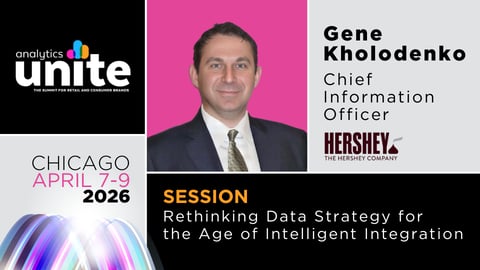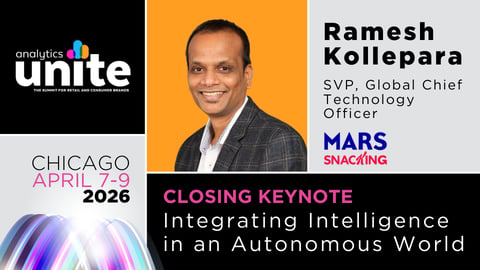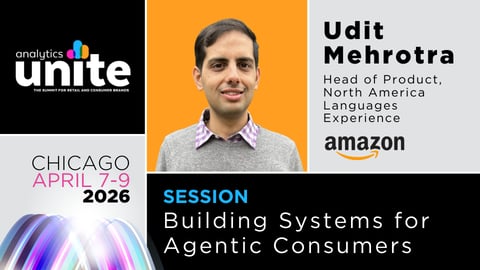Kellogg Unlocks Power of Cross-Domain Data in the New Analytics Economy
“Pursue the problems, not the business cases,” was the first core principle Rob Birse, VP, global advanced analytics and AI/ML technology at the Kellogg Company shared with the audience at Analytics Unite.
Talking about the customer problems that need to be solved is a good way to start the conversation, he said, because “it creates a common language between the analytics and the commercial around your business.“
“Once you’ve identified your problems, you can move on to use cases, which are key to building your strategy, and you can add your data. We call it our value-based data strategy,” explained Birse, which entails utilizing only the most necessary targeted data to solve the problem at hand.
[More from Analytics Unite: How Estée Lauder and Best Buy Use Analytics to Solve for Tomorrow’s Disruption]
He pointed to the three horizons the company uses to plan against: now, next, and beyond. A ‘now’ horizon use case focuses on what can be done today to visibly move the needle in the eyes of the stakeholders in the shortest time possible, typically relying on the age-old 80/20 rule — that 20% of the actions taken will result in 80% of the business benefits.
The "next" horizon involves enterprise-grade operationalization with a deeper investment in scaling. The "beyond" horizon, “brings the shock and awe to your story; it’s the sizzle in your analytics, the shiny object,” said Birse, “and fundamentally is the glue that stitches together your story.” Bringing it all together in end-to-end storytelling is the critical piece.
“If you don’t have a good story, one where people can recognize themselves, you won’t be successful.”
Retailer Data Relationships are Evolving
Opportunities for CPGs like Kellogg to collaborate with retail partners are changing. Siloed relationships in which a CPG purchases retailer data and uses ad-hoc are moving towards tactical relationships.
“We’re beginning to see fledgling signs of interruptibility and integration from online and offline media which is a fantastic step forward as grocery stores become media companies.”
Interested in Learning More About Grocery Advancements?
The inaugural GroceryTech event, produced by Progressive Grocer and RIS News, brings together the combined community of business and technology grocery executives on the journey to modernize their technology infrastructure to support innovation — to help grocers replicate the “small neighborhood grocery store on the corner” concept, while still operating profitably at scale.
Learn more.
Ultimately, Birse said, CPGs want fully-integrated enterprise-level relationships with their retail partners making them capable of building a much closer relationship with their customers with the ability to go deep on granular and personal levels.
All of that is built on a foundation of trust, he said. “If we’re going to share data, we need to trust each other. We have to build solid relationships so that, mutually, we’re going to win together. It’s not a short-term affair, it’s a long-term relationship.”
Birse shared how a fully integrated use of shared data and analytics in full-funnel marketing can create laser-targeted customized shopping experiences and shepherd savvy customers through the marketing funnel with precision. The process, once completed, results in a rich data set that can be shared with the supply chain; for example, “to get on top of demand, instead of chasing it,” he said.
Affinity marketing will level up, he predicts, as generative AI becomes safer to use. For example, AI might be used to tweak the creative on certain ad campaigns to create dynamic, personalized ads that allow customers to recognize themselves and what appeals most to them, capturing an extra level of conversion.
Birse cautioned against using data in an “everything, everywhere, all at once” mentality, referencing the Oscar-winning film. “You have to think of it more a la carte,” he said. “It’s not an all-you-can-eat buffet all the time. It’s poorer quality when you do it that way.”
And it’s critical to let the machine decide which levers to pull, and in what sequence to pull them, because each door has a different opportunity depending on the circumstances, like position and demographic.
“Businesses have been data-led for quite some time,” said Birse. “If we’re not partner-driven, if we’re not going to bring partnerships to our data use cases, we’re not going to succeed.”
Birse encourages leaders to focus on building those collaborative partnerships for the future.
“Selling data is a quick cash grab. Sharing data has got much more long-term return on investment that can last you much longer than anything you can imagine.”






